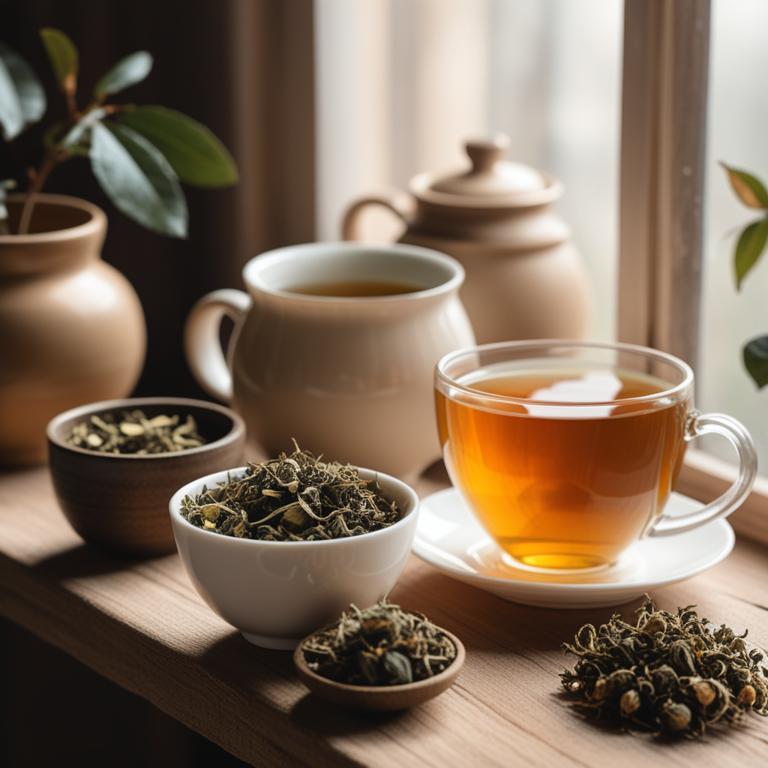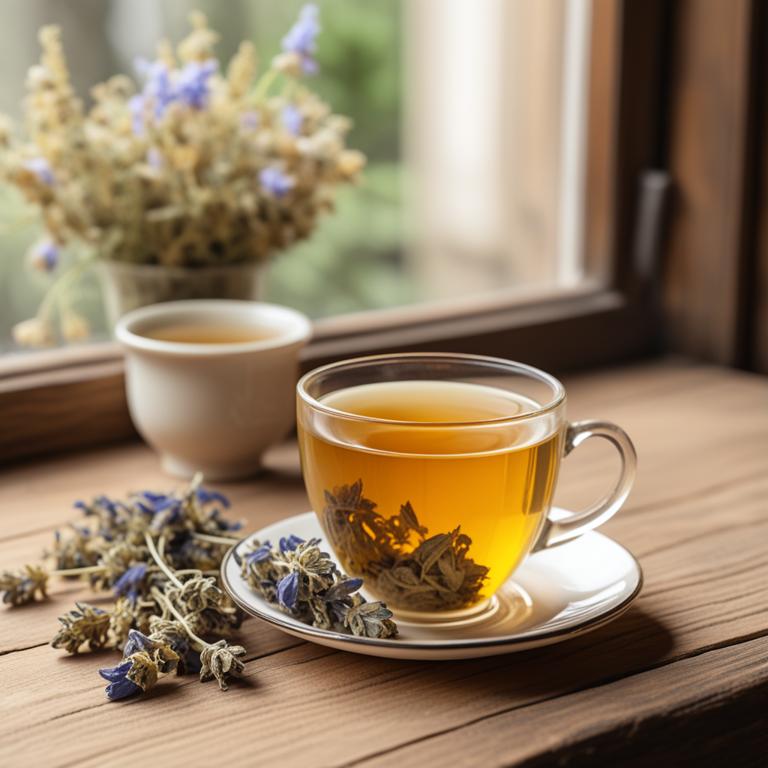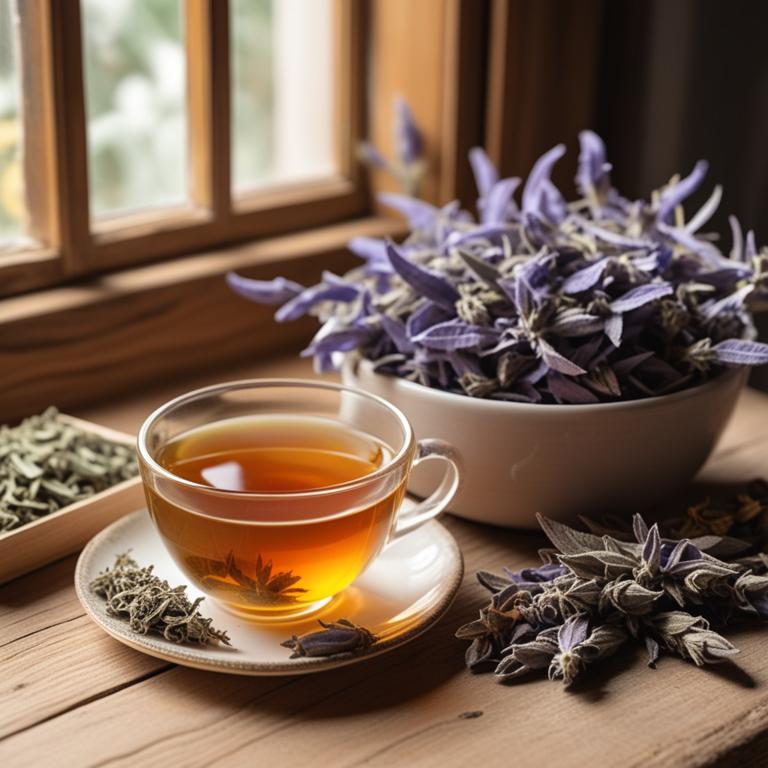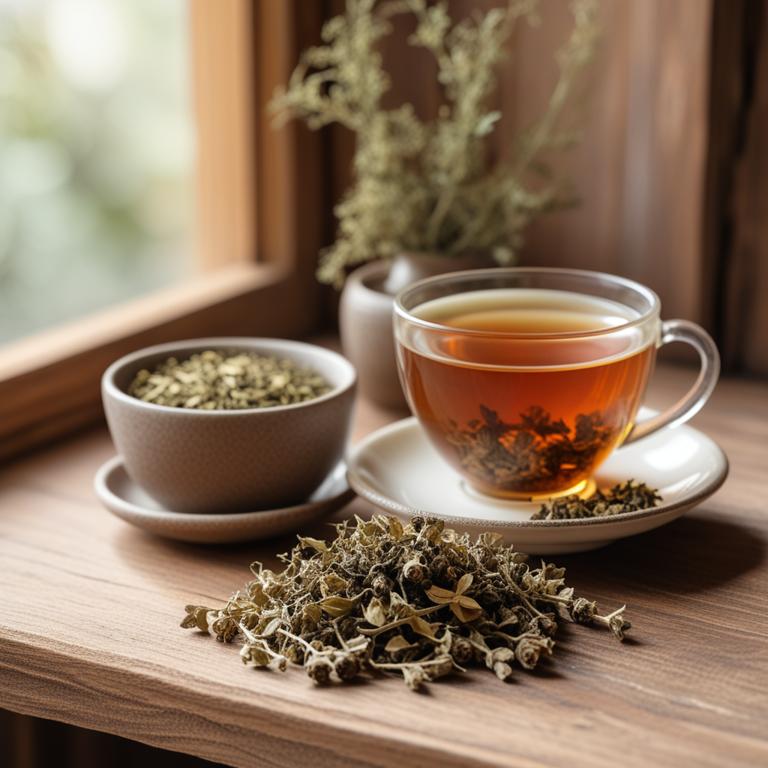11 Best Herbal Teas For Inflamed Mouth

Herbal teas for inflamed mouth, also known as stomatitis, are a natural remedy used to treat the inflammation, pain, and discomfort associated with this condition.
These teas are beneficial in treating inflamed mouth due to their antibacterial, anti-inflammatory, and soothing properties, which help to reduce swelling, ease pain, and promote healing.
Examples of herbal teas used to treat inflamed mouth include peppermint tea, which cools and calms the mouth, chamomile tea, which reduces inflammation and promotes relaxation, licorice root tea, which soothes and protects the mucous membranes, and ginger tea, which has anti-inflammatory properties and helps to reduce pain.
Other herbal teas, such as sage tea, calendula tea, and echinacea tea, are also used to treat inflamed mouth due to their ability to reduce inflammation, fight infection, and promote healing.
According to "Complementary therapies in medicine", teas for inflamed mouth, such as sage tea, may have a promising effect in alleviating oral mucositis, as suggested by a study that found a lower incidence of oral mucositis in patients using a sage tea-thyme-peppermint hydrosol oral rinse in conjunction with basic oral care.
Below there's a list of the 11 best herbal teas for inflamed mouth.
- 1. Aloe vera teas
- 2. Mentha x piperita teas
- 3. Echinacea purpurea teas
- 4. Cinchona officinalis teas
- 5. Glycyrrhiza glabra teas
- 6. Zingiber officinale teas
- 7. Corydalis ambigua teas
- 8. Pimpinella anisum teas
- 9. Salvia officinalis teas
- 10. Taraxacum officinale teas
- 11. Zanthoxylum bungeanum teas
Also you may be interested in...
TODAY'S FREE BOUNDLE
Herb Drying Checklist + Herbal Tea Shopping List + Medicinal Herbs Flashcards
Enter you best email address below to receive this bundle (3 product valued $19.95) for FREE + exclusive access to The Aphotecary Letter.
$19.95 -> $0.00
1. Aloe vera teas

Aloe vera teas have been traditionally used to treat mouth sores and inflammation, particularly for conditions such as mouth ulcers and canker sores.
This herbal preparation contains anti-inflammatory and antiseptic properties that help to soothe and calm irritated tissues, reducing pain and discomfort.
The bioactive constituents of aloe vera, including aloin and aloe-emodin, have been shown to exhibit anti-inflammatory and antimicrobial activities that aid in treating mouth sores and preventing infection.
The benefits of using aloe vera teas to treat mouth ailments include rapid healing, reduced pain, and prevention of scarring, making it a popular natural remedy for oral health issues.
Related Study
According to "Journal of pharmacy & bioallied sciences", Aloe vera teas may be beneficial for inflamed mouth due to its excellent applications in treating gum disorders and its demonstrated good antifungal activity in the oral cavity.
2. Mentha x piperita teas

Mentha x piperita teas, also known as peppermint tea, have been traditionally used to treat the inflamed mouth ailment known as mouth ulcers or canker sores.
The anti-inflammatory properties of mentha x piperita teas help to reduce the pain and discomfort associated with mouth ulcers, making it easier to eat and speak.
The bioactive constituents of this herbal preparation, including menthone and limonene, have been shown to possess antimicrobial and antioxidant properties that help to soothe and heal the affected area.
By consuming mentha x piperita teas, individuals can benefit from reduced inflammation, pain, and healing time, making it a natural and effective remedy for treating mouth ulcers.
Related Study
According to the study, Mentha x piperita teas may be beneficial for an inflamed mouth due to its traditional use in treating oral mucosa and throat inflammation.
3. Echinacea purpurea teas

Echinacea purpurea teas have been traditionally used to treat inflamed mouth ailments such as canker sores and mouth ulcers due to their anti-inflammatory and antimicrobial properties.
This herbal preparation helps to reduce inflammation and alleviate pain by promoting the healing process and soothing the mucous membranes in the mouth.
The bioactive constituents of Echinacea purpurea, including alkylamides, caffeic acid derivatives, and polyphenols, work synergistically to exhibit these beneficial effects.
By consuming Echinacea purpurea teas, individuals can experience relief from mouth sores and ulcers, as well as a reduced risk of infection and faster recovery times.
Related Study
According to "PeerJ", Echinacea purpurea teas may be beneficial for inflamed mouth due to their anti-inflammatory properties, which have been shown to inhibit the production of pro-inflammatory cytokines in human tonsil epithelial cells.
4. Cinchona officinalis teas

Cinchona officinalis teas have been traditionally used to treat the inflamed mouth ailment, also known as mouth ulcers or stomatitis.
The anti-inflammatory properties of Cinchona officinalis teas help to reduce swelling and pain associated with mouth ulcers, while also promoting healing and preventing further infection.
The bioactive constituents of this herbal preparation, including quinine and alkaloids, exhibit antimicrobial and anti-inflammatory activities that aid in the treatment of mouth ulcers.
The benefits of using Cinchona officinalis teas to treat mouth ulcers include reduced pain and discomfort, accelerated healing, and prevention of secondary infections, making it a valuable natural remedy for this condition.
5. Glycyrrhiza glabra teas

Glycyrrhiza glabra teas, derived from the roots of the licorice plant, have been traditionally used to treat mouth ulcers and other inflamed oral conditions due to their anti-inflammatory and soothing properties.
The bioactive constituents of Glycyrrhiza glabra, including glycyrrhizin and flavonoids, help to reduce inflammation and promote healing by inhibiting the production of pro-inflammatory enzymes and enhancing the production of antioxidants.
This herbal preparation helps to treat inflamed mouth ailments by providing a protective barrier to the affected area, reducing pain and discomfort, and promoting a healthy oral environment.
The benefits of using Glycyrrhiza glabra teas to treat inflamed mouth ailments include reduced inflammation, accelerated healing, and prevention of secondary infections, making it a popular natural remedy for oral health issues.
Related Study
According to "Journal of Ayurveda and integrative medicine", Glycyrrhiza glabra teas for inflamed mouth may be beneficial due to its anti-inflammatory properties, particularly due to the presence of bioactive ingredients such as glabridin, licoricidin, licorisoflavan A, licochalcone A, and glycyrrhizin.
6. Zingiber officinale teas

Zingiber officinale teas, derived from the rhizomes of the ginger plant, have been traditionally used to treat inflamed mouth ailments such as gingivitis and oral ulcers.
The anti-inflammatory and antioxidant properties of this herbal preparation help to reduce swelling and prevent further irritation, promoting a faster recovery.
The bioactive constituents, including gingerols and shogaols, exhibit potent anti-inflammatory activity, inhibiting the production of pro-inflammatory cytokines and enzymes that contribute to tissue damage.
Regular consumption of Zingiber officinale teas has been shown to provide benefits in treating inflamed mouth ailments, including reducing pain, promoting wound healing, and preventing the recurrence of oral ulcers.
Related Study
According to "Journal of ethnopharmacology", Zingiber officinale teas for inflamed mouth may be beneficial due to its bioactive compound lariciresinol, which was found to inhibit efflux pumps in bacteria, such as Salmonella typhimurium, potentially reducing inflammation and promoting healing.
7. Corydalis ambigua teas

Corydalis ambigua teas have been traditionally used to treat inflamed mouth ailments, such as canker sores and mouth ulcers, due to its anti-inflammatory and antimicrobial properties.
The bioactive constituents of Corydalis ambigua, including tetrahydroprotoberberine alkaloids and flavonoids, help to reduce inflammation and prevent infection, promoting a faster recovery from mouth ulcers.
These herbal teas are believed to help treat inflamed mouth ailments by reducing swelling, pain, and discomfort, allowing the affected area to heal quickly.
The benefits of using Corydalis ambigua teas to treat inflamed mouth ailments include a reduction in pain and discomfort, faster healing, and prevention of secondary infections, making it a popular natural remedy for this condition.
8. Pimpinella anisum teas

Pimpinella anisum teas have been traditionally used to treat the inflamed mouth ailment known as oral mucositis, due to its anti-inflammatory and antimicrobial properties.
The bioactive constituents such as anethole and limonene present in Pimpinella anisum teas help to reduce inflammation and combat bacterial infections, thereby aiding in the relief of oral mucositis symptoms.
The herbal preparation helps to treat oral mucositis by reducing the severity of mucosal damage, promoting tissue repair, and alleviating pain associated with the condition.
The benefits of using Pimpinella anisum teas to treat oral mucositis include reduced inflammation, accelerated healing, and improved oral health, making it a valuable adjunctive therapy in managing this condition.
9. Salvia officinalis teas

Salvia officinalis teas have been traditionally used to treat inflamed mouth ailments, such as mouth sores and gum inflammation, due to their anti-inflammatory and antimicrobial properties.
The herbal preparation helps to treat this ailment by reducing swelling and fighting off bacteria that cause infection.
The bioactive constituents of Salvia officinalis, including rosmarinic acid and carnosic acid, exhibit potent antioxidant and anti-inflammatory effects that contribute to its therapeutic benefits.
Drinking Salvia officinalis teas can provide relief from mouth sores and gum inflammation, promoting a healthy oral environment and reducing the risk of complications.
Related Study
According to "European journal of medical research", Salvia officinalis teas for inflamed mouth, which is associated with viral pharyngitis, have been shown to provide symptomatic relief and reduce throat pain intensity scores within the first two hours of administration, with a 15% spray being significantly superior to placebo in a clinical study.
10. Taraxacum officinale teas

Taraxacum officinale teas, also known as dandelion root tea, have been traditionally used to treat inflamed mouth ailments, such as mouth ulcers and sore throats, due to their anti-inflammatory and antimicrobial properties.
The bioactive constituents of Taraxacum officinale teas, including flavonoids, phenolic acids, and terpenoids, help to reduce inflammation and combat bacterial and fungal infections that can cause mouth ulcers.
By consuming Taraxacum officinale teas, individuals can experience relief from mouth pain and discomfort, as well as a reduction in the severity and duration of mouth ulcers.
The benefits of using Taraxacum officinale teas to treat inflamed mouth ailments include their natural, non-invasive, and cost-effective approach to promoting oral health and well-being.
11. Zanthoxylum bungeanum teas

Zanthoxylum bungeanum teas, also known as prickly ash tea, have been traditionally used to treat mouth ulcers and inflamed mouth ailments due to its anti-inflammatory and antimicrobial properties.
The bioactive constituents of this herbal preparation, such as ferulic acid and coumarins, help to reduce inflammation and combat bacterial infections that cause mouth ulcers.
By incorporating Zanthoxylum bungeanum tea into one's treatment plan, individuals can experience relief from painful mouth ulcers and inflamed mouth tissues.
The benefits of using this herbal preparation include its ability to reduce pain, promote healing, and prevent future occurrences of mouth ulcers.
Related Study
According to "PloS one", Zanthoxylum bungeanum teas may have potential as an antibacterial agent against oral pathogens such as P. gingivalis, which is associated with periodontitis and inflamed mouth.